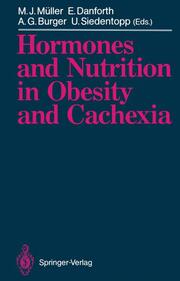Detailansicht
Hormones and Nutrition in Obesity and Cachexia
ISBN/EAN: 9783540516378
Umbreit-Nr.: 6592263
Sprache:
Englisch
Umfang: x, 176 S., 33 s/w Illustr., 176 p. 33 illus.
Format in cm:
Einband:
kartoniertes Buch
Erschienen am 23.03.1990
Auflage: 1/1990
- Zusatztext
- International experts are brought together in this book to give basic as well as clinical data on obesity and cachexia, and an integrated picture of the regulation of intermediary metabolism in both situations. The data provide evidence that tissue catabolism and anabolism are regulated by similar mechanisms, which again are the target of different hormonal and metabolic factors. This joint discussion of the similarities evident in both areas will greatly benefit future understanding and research in obesity and cachexia.
- Kurztext
- InhaltsangabeCentral Role of the Liver in Metabolism.- Regulation of Intermediary Metabolism by Substrate Supply, Hormone Concentrations and Nervous Activity.- Hormonal Adaptations to Energy Intake and Determinants of Energy Expenditure.- Hormonal Adaptation to Over- and Underfeeding.- Hormonal and Metabolic Determinants of Energy Expenditure in Humans.- Sympathetic Nervous System in the Regulation of Thermogenesis.- Organ Contribution to Energy Expenditure in Humans.- Thermogenic Role of Brown Adipose Tissue and Skeletal Muscle in Humans.- Physiological Significance of Substrate Cycling in Humans.- The Role of Triglyceride-Fatty Acid Cycling and Glucose Cycling in Thermogenesis and Amplification of Net Substrate Flux in Human Subjects.- Hormones, Nutrition, Obesity, Cachexia.- Hormonal and Nutritional Factors Contributory to Obesity.- Thermogenesis in Obesity and Cachexia.- Hormonal and Nutritional Factors Contributing to Tumour Cachexia.- Catabolism in Patients with Liver Cirrhosis.- Muscle Protein Turnover.- Physiological and Pathophysiological Regulation of Human Muscle Protein Turnover.- Nutritional Support Following Trauma and the Use of Indirect Calorimetry.- Influence of Stress on the Endocrine System and Nutritional Support in Surgical Patients.- Importance of Indirect Calorimetry for the Nutrition of Intensive Care Patients.- Overview.
- Autorenportrait
- InhaltsangabeCentral Role of the Liver in Metabolism.- Regulation of Intermediary Metabolism by Substrate Supply, Hormone Concentrations and Nervous Activity.- Hormonal Adaptations to Energy Intake and Determinants of Energy Expenditure.- Hormonal Adaptation to Over- and Underfeeding.- Hormonal and Metabolic Determinants of Energy Expenditure in Humans.- Sympathetic Nervous System in the Regulation of Thermogenesis.- Organ Contribution to Energy Expenditure in Humans.- Thermogenic Role of Brown Adipose Tissue and Skeletal Muscle in Humans.- Physiological Significance of Substrate Cycling in Humans.- The Role of Triglyceride-Fatty Acid Cycling and Glucose Cycling in Thermogenesis and Amplification of Net Substrate Flux in Human Subjects.- Hormones, Nutrition, Obesity, Cachexia.- Hormonal and Nutritional Factors Contributory to Obesity.- Thermogenesis in Obesity and Cachexia.- Hormonal and Nutritional Factors Contributing to Tumour Cachexia.- Catabolism in Patients with Liver Cirrhosis.- Muscle Protein Turnover.- Physiological and Pathophysiological Regulation of Human Muscle Protein Turnover.- Nutritional Support Following Trauma and the Use of Indirect Calorimetry.- Influence of Stress on the Endocrine System and Nutritional Support in Surgical Patients.- Importance of Indirect Calorimetry for the Nutrition of Intensive Care Patients.- Overview.
